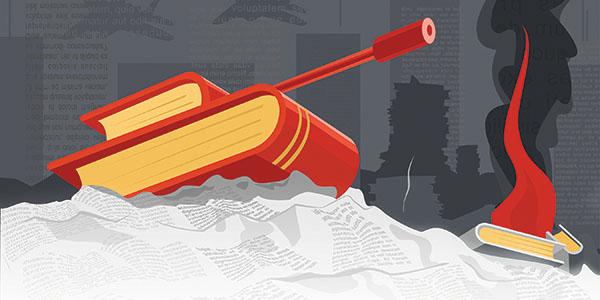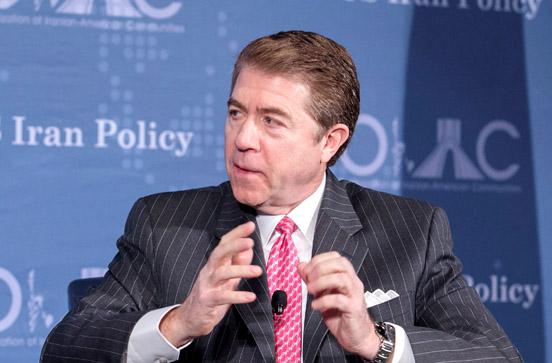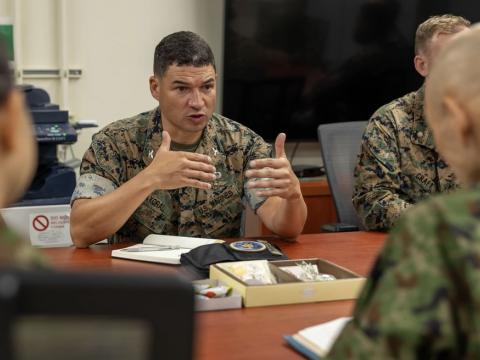A New Front in Information Warfare
One does not have to look too far beyond the headlines to see that the battle for world power is playing out in the information space. Free and open democratic societies increasingly are tested by rising autocratic countries employing high technology in information warfare.
For the United States to succeed in this battle, citizens, not just the government, need to be more discerning about information, experts say.
The country’s citizens are not well-versed in state-controlled messages or propaganda commonly used by closed, autocratic societies. Americans must learn to handle digital meddling by adversaries, defend Western democracy and freedoms, and improve the country’s stance in assessing the truth, information warfare experts recommend.
“The domain has shifted to information, and this is where the contest is being waged,” says Ambassador Lincoln Bloomfield, a defense and foreign policy official in five previous administrations and chairman emeritus, Stimson Center. “And we have a lot to do. We need to recognize what is being done to us and learn how to survive it. We need to figure out how to validate and authenticate [information] and use reality to stare down these aggressors in the information space. Our weapon is the truth.”
The consequences if the United States does not act could be huge, warns Brig. Gen. Bruce McClintock, USAF (Ret.), CEO, Zenith Advisors Group, and adjunct policy analyst, RAND Corp. “The damage to our society—in the form of declining trust in institutions and a fading of the border between fact and opinion—is readily apparent. This is a clear and present danger that should be addressed immediately,” he says.
The advancement of technology, meant to aid and ease communication, has shifted the information warfare battlefield. This has allowed adversaries a greater reach, Gen. McClintock warns. “The improved analytics possible via the Internet also allows practitioners to precisely target a select audience,” he says. The general adds that he finds this change in influence operations “significant and concerning.”
To professor John Hurley, College of Information and Cyberspace, National Defense University, the information warfare battlefield now extends to all segments of society. “Information warfare is no longer predominately a military issue,” Hurley says. “We no longer have the apples-to-apples comparison that we had before, with the military fighting on one side and another military fighting on the other side, and where the public and private sectors were really kind of outside of this view of the battle. That has dynamically changed as we have become such an information-centric society.”
Moreover, the previous rules of engagement no longer apply, Hurley notes. A lot more players now can create an impact. Techniques once limited to militaries or governments are “widely available to anyone with a credit card or basic technical skills,” Gen. McClintock adds. The public has access to more commercially available technologies for radio frequency spectrum mapping, satellite eavesdropping, cyber surveillance, and jamming and hijacking, he says.
The biggest threats to the United States come from Russia and China, which have made information warfare a national offensive strategy. Both nation-states have “the technical capability to impose costs on our society and military through information warfare,” Gen. McClintock states. “Russia is the most immediate threat because they are brazenly engaging in information warfare not only against our military but against our societal values.”
Russia’s tactic of trying to exploit conflicts within American society is not new. “This is a very old game from the Russians,” Bloomfield observes. When visiting the country back in the 1970s, he saw how the Russians were showing on TV segregation films of the American South from the 1950s—grainy black-and-white footage of police brutality. “That footage playing on Soviet television 20 years later was to undermine the image of the United States [within Russia], hoping that Russians would exploit the painful differences under the surface that Americans were trying to manage and overcome, then harness those cracks and fissures, and weaken our country,” Bloomfield says.
Meanwhile, China’s habitual use of information warfare presents a dangerous military threat, given the country’s systems confrontation form of warfare, which Gen. McClintock says China has spent decades refining. According to a study from RAND colleague Jeffrey Engstrom, senior policy analyst, the Chinese have shifted their military doctrine. They no longer see war as a battle of traditional military weapons and forces but as a conflict of operational systems. “Within their system-of-systems thinking, China has designed a robust information confrontation system,” Gen. McClintock warns. The information battlefield of the People’s Liberation Army includes three domains: electronic, cyber and psychological, he adds. The military has aligned its efforts—adding new equipment and platforms—to pursue systems confrontation, and the Chinese see victory as a destruction of systems, Engstrom reports.
China and Russia, along with Iran, North Korea, Syria and other places “where there is a closed society and a ruling circle that never wants to give up power,” Bloomfield says, also are using information technology to repress their own citizens. For example, China is installing 500 million security cameras for a facial recognition database of every citizen, which the country will use to monitor citizens’ activities. The Iranians have developed applications that, when downloaded, deceptively capture users’ contacts and emails and any associated information. This information is housed in a central database at the headquarters of the Iranian Revolutionary Guard to monitor communications within and outside the country, including correspondence “with overseas relatives who may be American citizens,” Bloomfield reports.
What these countries lack, however, is the power of democracy—and truth. “Although America is not perfect, in our open society, with individual rights, free speech and an independent media, our citizens can conduct their daily lives, visit who they like and voice their opinions, all without control, interference or punishment by the government,” Bloomfield says. “This is not true in Russia, China, Iran or North Korea. There is a falsehood that lies at the heart of what they do. If you look at these adversaries, the ones that could threaten us, they have a lot of secrets that they are trying to keep from their own people.”
For instance, newly re-elected Russian President Vladimir Putin is hiding money in offshore accounts and does not want his citizens to know about it, Bloomfield reports. “That is something Putin clearly fears,” the ambassador ventures. The same concerns about corruption abound in Iran, he adds. Citizens who believe the regime has taken their resources and spent funds in ways that are not serving the people have held demonstrations in more than 120 Iranian cities and towns.
The United States can stand up to such autocrats by revealing their actions. Bloomfield recommends that the United States issue a series of detailed unclassified reports on the activities of Russia’s leaders. “These would represent our government’s best assessment of the truth,” he says, adding that it could be a NATO-wide effort, published in various formats, including video, audio, print and digital, in several languages, including Russian.
In testimony last year to the U.S. House Foreign Affairs Committee, Bloomfield offered that the reports should cover, among other topics, estimates of hidden funds and properties controlled by Russia’s leader and security services; Russia’s “gray zone” warfare efforts against Crimea and eastern Ukraine, including Geneva Convention violations; Russian combat operations in Syria over the past year, including the destruction of hospitals and other sites protected under international law; the Russian government’s culpability in the downing of Malaysia Airlines Flight 17; several mysterious deaths and poisonings of Putin government critics; and details of the alleged $30 billion in corruption surrounding the 2014 Sochi Olympics.
Gen. McClintock would take it one step further than unveiling the truth: penalties or sanctions. “The United States should acknowledge that our cyberspace strategy has failed to deter aggression against the United States and others,” he stresses. “Future U.S. strategy should place greater emphasis on tangible costs for violating our definitions of cyber norms.” Without such sanctions, malicious actions will continue or intensify, the general says.
In Hurley’s opinion, the matter should be handled as a national security issue. “A clear, unified message to our citizens, companies and the military should squarely address the challenges and risks of having such a data-driven and data-intensive society,” he says. “We’ve rarely looked at the consequences or the downsides of technology, the risks involved in how we communicate, how we organize and how we work.”
Gen. McClintock agrees that a nationwide effort is needed. “Overall, the U.S. should openly acknowledge the increased threat, undertake a whole-of-nation effort to act, map and monitor the threat vectors, defend against them and, when appropriate, attack them,” he states.
U.S. citizens and newsmakers must strengthen their information awareness, these experts stress. “More and more in this atmosphere, Americans need to be able to discern the authenticity of information,” Bloomfield says. “I think the suspicions have now been raised. And what I think what you’ll see in the United States, and it’s already starting to happen, is a conversation about how to validate the authenticity of information—of any news.”
Inoculating the American public against the growing threat of information warfare also means “fortifying our educational system with increased emphasis on media literacy and critical thinking,” says Gen. McClintock, who retired from the Air Force last year. In addition, he recommends that the country set standards for how all media outlets and online platforms, including social media, identify and distinguish between objective facts, news and opinions. “There are ways to protect freedom of speech while avoiding the kind of state control imposed by countries like Russia and China,” he offers. “We should not let the need to protect our basic freedoms prevent us from halting the fading of the line between opinion and fact and the alarming drop in public confidence in formerly respected sources of factual information.”
Bloomfield agrees that the media can play an important role in information warfare, starting with validation of sources. “The whole ‘fake news’ controversy has challenged media and correspondents to stand up straight and say, ‘We’ve checked everything twice, and we vouch for our sources, and reputations really matter,’” Bloomfield says.
In addition, social media companies need to come forward to find solutions to the vulnerabilities their platforms present to adversaries in information warfare. “Clearly, they have a problem, and clearly, they haven’t solved it, and I question whether they know how to solve it all by themselves,” he says. “What they really should be doing is turning and asking for help.”
Bloomfield, Hurley and Gen. McClintock offered their insights on the changing nature of information warfare, stressing that their opinions are not necessarily the views of their respective organizations.







Comments